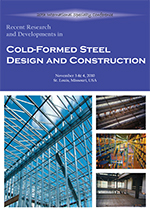Session Dates
03 Nov 2010
Abstract
Currently, the behavior of screw connections subject to combined tension pull- out and shear forces is not well understood. An experimental study was conducted at Missouri Un iversity of Science and Technology to better understand the relationship or interac tion between these forces. The test program evaluated four parameters that may influence the behavior of pure tension and pure shear in screw connections: the thickness of the sheet not in contact with the screw head, the ultimate strength of the steel, the ductility of the steel, and the screw diameter. Based on the behavior observed and analysis of the test data, this work formulated new design recommendations for use in calculating the design capacity of screw connections subject to this potential limit state.
Department(s)
Civil, Architectural and Environmental Engineering
Research Center/Lab(s)
Wei-Wen Yu Center for Cold-Formed Steel Structures
Meeting Name
20th International Specialty Conference on Cold-Formed Steel Structures
Publisher
Missouri University of Science and Technology
Document Version
Final Version
Rights
© 2010 Missouri University of Science and Technology, All rights reserved.
Document Type
Article - Conference proceedings
File Type
text
Language
English
Recommended Citation
Francka, R. M. and LaBoube, R. A., "Screw Connections Subject to Tension Pull-out and Shear Forces" (2010). CCFSS Proceedings of International Specialty Conference on Cold-Formed Steel Structures (1971 - 2018). 5.
https://scholarsmine.mst.edu/isccss/20iccfss/20iccfss-session11/5
Screw Connections Subject to Tension Pull-out and Shear Forces
Currently, the behavior of screw connections subject to combined tension pull- out and shear forces is not well understood. An experimental study was conducted at Missouri Un iversity of Science and Technology to better understand the relationship or interac tion between these forces. The test program evaluated four parameters that may influence the behavior of pure tension and pure shear in screw connections: the thickness of the sheet not in contact with the screw head, the ultimate strength of the steel, the ductility of the steel, and the screw diameter. Based on the behavior observed and analysis of the test data, this work formulated new design recommendations for use in calculating the design capacity of screw connections subject to this potential limit state.



